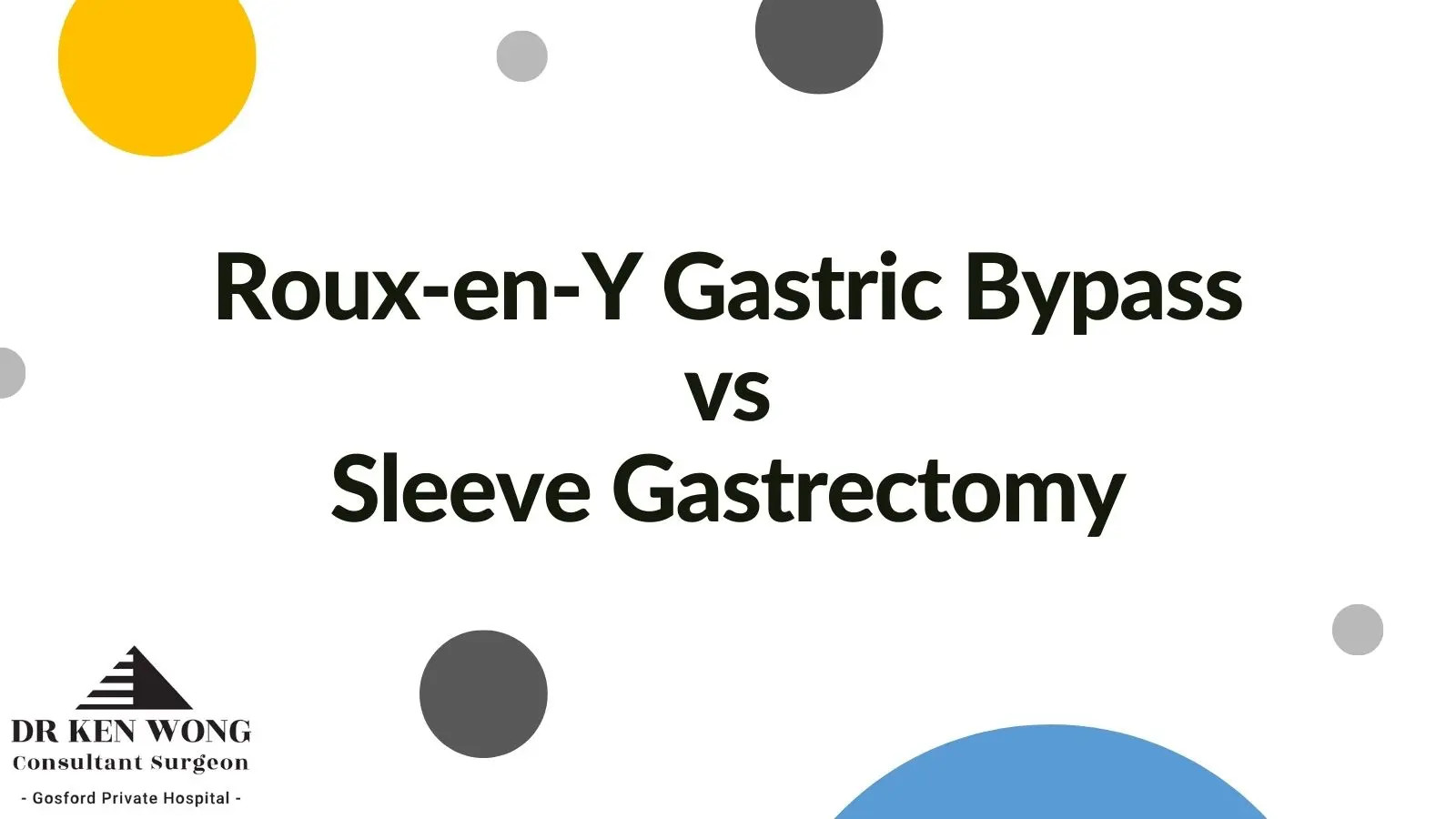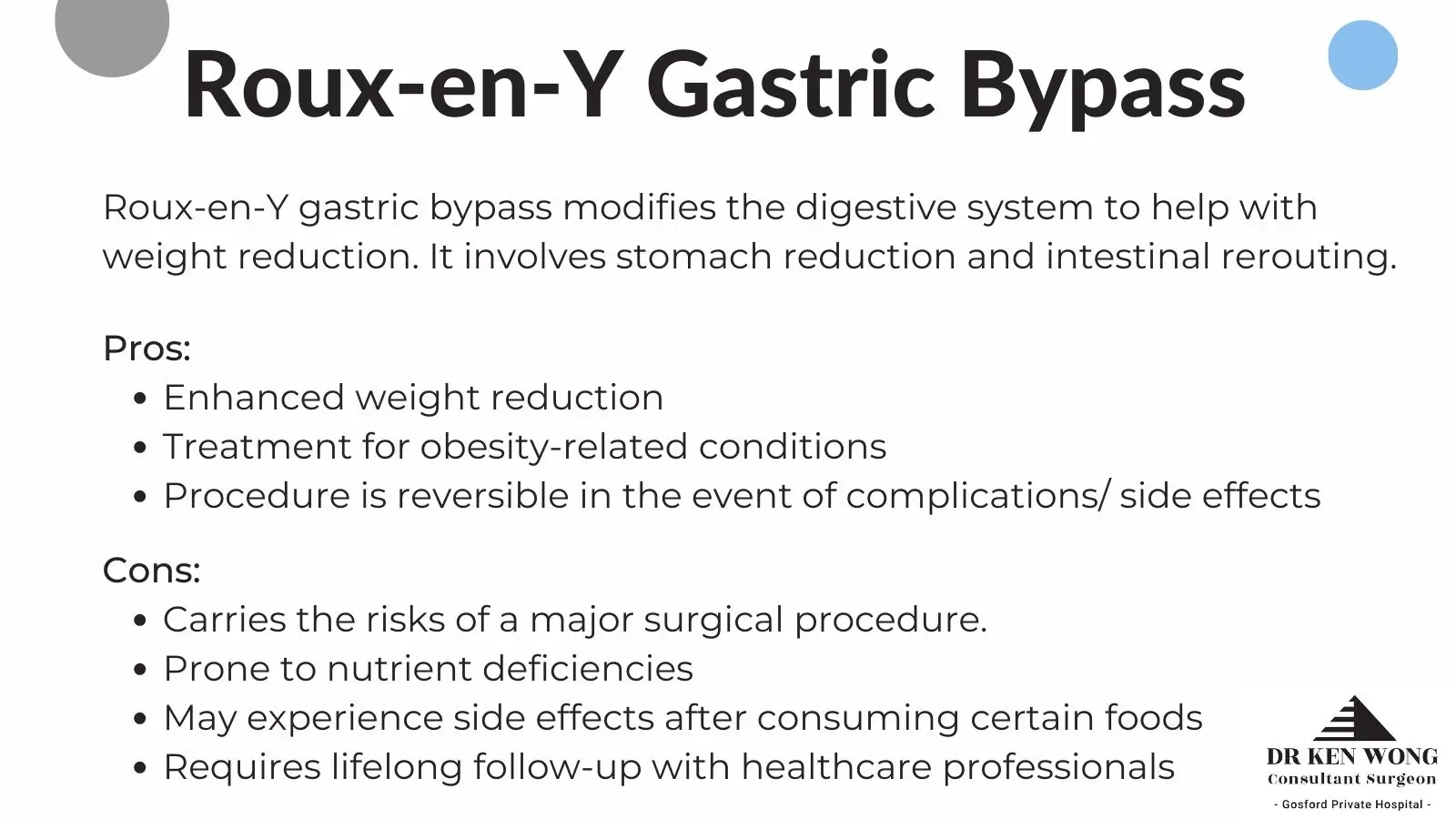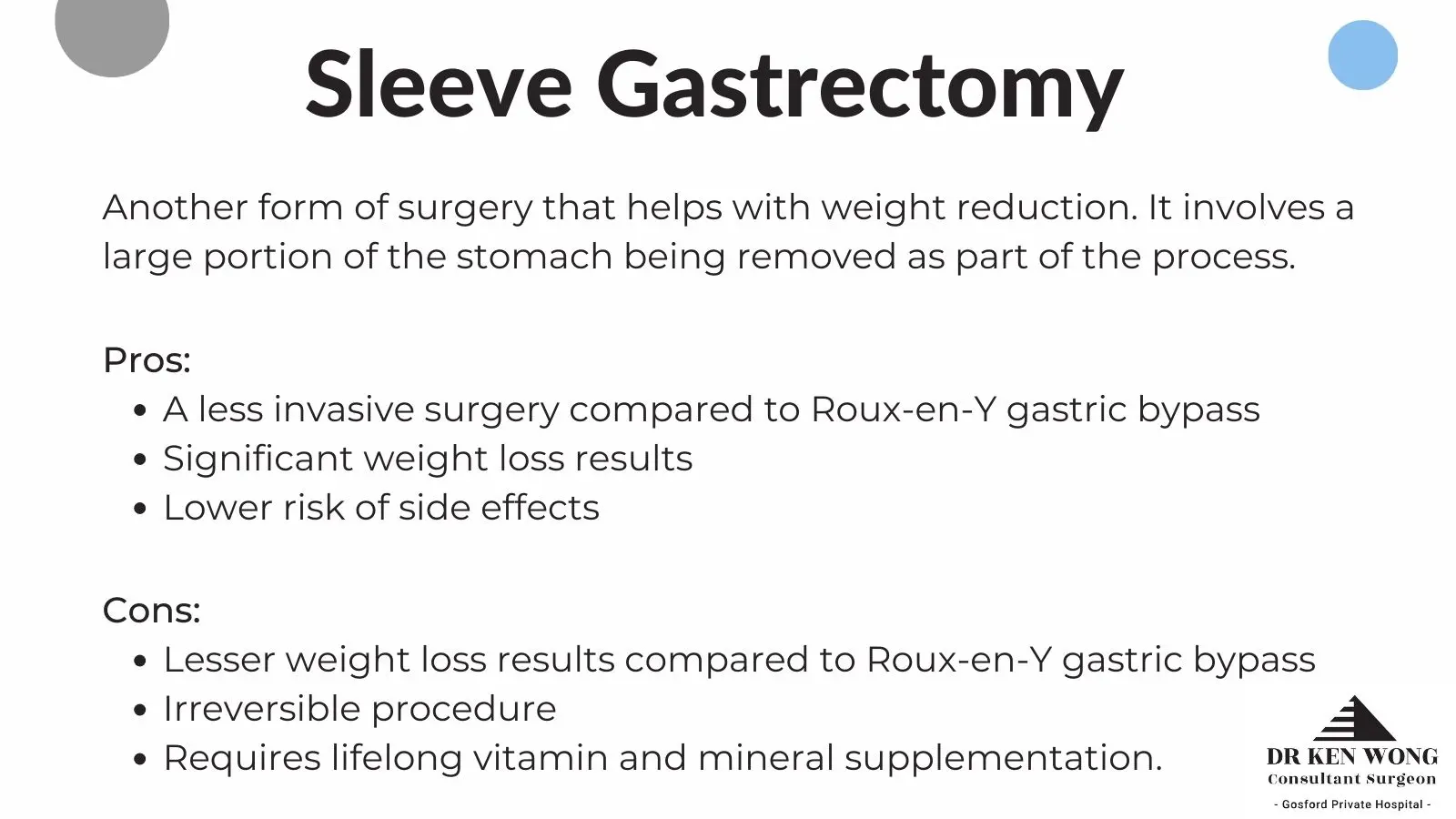
Roux-en-Y gastric bypass and sleeve gastrectomy are both viable options for effective weight loss, but differences in their processes can impact the results (and risks) of the surgery.
This guide will present a detailed comparison of both procedures, from an overview of the processes to the post-surgery recovery period. By understanding what to expect with both Roux-en-Y gastric bypass and sleeve gastrectomy, you can make an informed decision as to which weight loss surgery is best for you.
What is a Roux-en-Y Gastric Bypass?
Roux-en-Y gastric bypass is a bariatric surgery procedure that involves the rerouting of the passage leading from the stomach to the small intestine. In this process, surgeons will create a small pouch from the upper portion of your stomach, to reduce its size and food capacity. The larger, separated portion of the stomach will remain within the body.
Next, a segment of the small intestine, known as the jejunum, will be divided. The lower end of it will be attached to the newly created upper stomach pouch, forming a "Y" shape (hence the name Roux-en-Y). After the procedure, any food consumed will now bypass the remaining stomach and the first part of the small intestine, leading to reduced calorie absorption.
Name of Procedure: Roux-en-Y Gastric Bypass
Otherwise referred to as:
-
RNY Gastric Bypass
-
Gastric Bypass
Suitable for: Individuals with a body mass index (BMI) of 40 or higher. Individuals with obesity-related conditions such as sleep apnea or diabetes will be eligible for the procedure with a BMI of 35 or higher.
Pros:
-
Significant weight loss: A Roux-en-Y gastric bypass can help patients achieve weight loss of up to 60-80% of their excess body weight. Most of this weight loss will occur in the weeks following the surgery.
-
Treatment for obesity-related conditions: Aside from weight loss, a Roux-en-Y gastric bypass can improve or even resolve obesity-issues like type 2 diabetes, sleep apnea, and high blood pressure.
-
Reversible procedure: The Roux-en-Y can be reversed to restore the body’s original digestive system in the event of complications or unwanted side effects.

Cons:
-
Major surgery: As a complex and invasive procedure, a Roux-en-Y gastric bypass carries the risks of a major surgical procedure.
-
Nutritional deficiencies: Due to the bypass of a section of the digestive system, patients will be prone to nutrient deficiencies such as iron and vitamin B12. Patients will need to take lifelong nutrient supplements to account for these deficiencies.
-
Dumping syndrome: Some patients may experience a side effect of nausea, vomiting, and excessive sweating after eating certain foods
-
Long-term follow-up: Patients will require lifelong follow-up with healthcare professionals to monitor their nutritional status and manage potential complications.
How long does it take?
Post-surgery, patients will need to be hospitalised for about 2-3 days. Following discharge from the hospital, there will also be a recovery period of several weeks where patients gradually switch from liquid food diets to solid foods.
Dietary changes after procedure:
Protein-rich foods such as chicken, fish, eggs, cheese, and nuts will form the primary portion of the new diet after the procedure, followed by fruits and vegetables. Patients on the post-surgery diet will be advised to avoid fatty foods and sugary foods, as the former can lead to weight gain, while the latter will lead to the aforementioned “dumping syndrome”.
What is a Sleeve Gastrectomy?
In a sleeve gastrectomy, about 80% of the stomach will be removed as part of the process. The resulting “stomach” will resemble a banana-shaped sleeve that has a greatly reduced size and surface area. This process works to limit the amount of food patients can eat before feeling full, resulting in fewer feelings of hunger.
Name of procedure: Sleeve Gastrectomy
Otherwise referred to as:
-
Vertical Sleeve Gastrectomy (VSG)
-
Gastric Sleeve Surgery
Suitable for: Individuals who are severely obese with a body mass index (BMI) of 40 or higher. Similar to the criteria for other bariatric procedures, individuals with a BMI of 35 or higher who are diagnosed with obesity-related conditions will be also eligible for a sleeve gastrectomy.
Pros:
-
Less invasive surgery: Sleeve gastrectomy is less complicated compared to Roux-en-Y gastric bypass, potentially leading to fewer surgical risks.
-
Substantial weight loss: Patients of sleeve gastrectomy can lose up to 50% of their excess body weight due to the procedure.
-
Lower risk of side effects: Because the procedure does not involve rerouting the intestines, the risk of certain complications like dumping syndrome are reduced.
Cons:
-
Lesser weight loss: Sleeve gastrectomy may not lead to as much weight loss as with a Roux-en-Y gastric bypass.
-
Irreversible procedure: After the portion of the stomach is removed out from the body during surgery, it cannot be reattached, making the results of the surgery permanent.
-
Nutritional deficiencies: The stark reduction in stomach size and food consumption will require lifelong vitamin and mineral supplementation.

How long does it take?
Post-surgery recovery from sleeve gastrectomy will require less time — patients will need to be hospitalised for about 1-2 days before they can be discharged. Likewise, there will also be a recovery period of several weeks where patients gradually switch from liquid food diets to solid foods.
Dietary changes after procedure:
To maintain weight loss results after sleeve gastrectomy, patients will need to avoid foods that are high in fats or sugar. Notably, carbonated drinks should be excluded from the new diet as the gas can build up pressure in the stomach, causing discomfort and potentially stretching its size. Meals sizes will also be reduced to smaller portions due to the reduced capacity of the stomach.
Choosing Between Roux-en-Y Gastric Bypass vs Sleeve Gastrectomy
So, which type of bariatric surgery is better for you, a Roux-en-Y gastric bypass or a sleeve gastrectomy?
Considering that both procedures are proven to effectively result in weight loss, this decision will ultimately come down to what your doctor advises for your specific health condition and situation. There are many other factors that can affect or pose risks to your health that only your doctor will be aware of, so it’s always best to follow the prescribed advice of your medical professional.
Central Coast Surgery is a clinic led by Dr Ken Wong, a highly experienced bariatric surgeon offering sleeve gastrectomy for individuals that want a reliable way to lose weight and enjoy a higher quality of life. You can read more about what’s involved in the procedure, as well as the cost of sleeve gastrectomy on our website, or contact our friendly team for more information.
